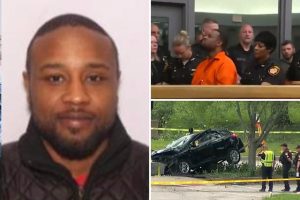There are stories that tear at the heart of a community. Stories so heavy with pain, grief, and confusion that no matter where you stand, you feel the weight of it. Cincinnati just lived one of those stories.
A father lost his son to police bullets. Hours later, that same father is accused of turning his grief into an act of fatal retaliation—allegedly striking and killing a sheriff’s deputy with his car. Two lives lost. Two families shattered. A city left searching for meaning in the aftermath.
Let’s break this down.
The Chain of Events
Rodney Hinton Jr., a 38-year-old father from Ohio, was charged with aggravated murder for allegedly using his vehicle to deliberately hit and kill a deputy directing traffic at a University of Cincinnati graduation event. The officer, whose name has not yet been released, died at the scene.
event. The officer, whose name has not yet been released, died at the scene.
Just hours before, Rodney Hinton had watched bodycam footage of the police shooting that ended his 18-year-old son Ryan Hinton’s life. The video reportedly showed officers yelling “gun” before firing. Officials say Ryan had a gun and pointed it at them during a stolen vehicle investigation, though the footage is blurry, and there’s no clear evidence he fired a shot. Still, in the eyes of law enforcement, the threat was present, and lethal force was justified.
Rodney couldn’t finish watching the footage. His lawyer said he was “understandably distraught.” That was the last anyone heard from him—until the deadly incident involving the deputy.
When Justice Feels Lopsided
To some, this reads like a man consumed by heartbreak, overwhelmed by the system that took his only son. To others, it’s an act of cold, calculated vengeance. The courtroom was filled with officers during his arraignment—a clear signal of the weight this carries for law enforcement. But beneath the surface is a deeper tension that has long simmered in America’s inner cities: what happens when justice feels like a one-way street?
We’ve heard this story before. A young Black man is killed during a police encounter. The narrative forms quickly: he had a gun, he posed a threat. The footage, as usual, is inconclusive. The community grieves. Law enforcement circles the wagons. Politicians offer condolences. And somewhere in between, families are left with questions that never seem to get answered.
Rodney Hinton did what many grieving families do—he sat down to review the footage, to try and make sense of it. But maybe it broke him. Maybe seeing his son’s final moments lit a fire too hot for him to hold.
Two Families, One Tragedy
Let’s be clear: there are no winners here. A law enforcement officer—likely someone’s husband, son, brother—was killed while simply doing his job. Ryan Hinton is dead, his future gone. Rodney Hinton is facing life in prison. That’s three lives destroyed. Three families mourning. And an entire community forced to reckon with what could’ve been done differently.
No one should take pleasure in either death. No cause is advanced by more blood spilled. But if we’re going to talk about what happened, we need to talk about why it happened. Because grief untreated turns into rage. And in neighborhoods where trust in law enforcement is already paper thin, that rage simmers just beneath the surface—waiting.
What Now?
We need space for truth, not just justice. Truth that examines not only what happened that day, but every day that led up to it. We need footage that isn’t blurry, narratives that aren’t one-sided, and transparency that doesn’t require public pressure to extract.
Ryan Hinton’s family deserves answers. The deputy’s family deserves peace. And Cincinnati deserves healing—not just from this tragedy, but from the decades of mistrust that made it possible.
Let’s not wait for another father’s heart to break before we start asking the hard questions.
